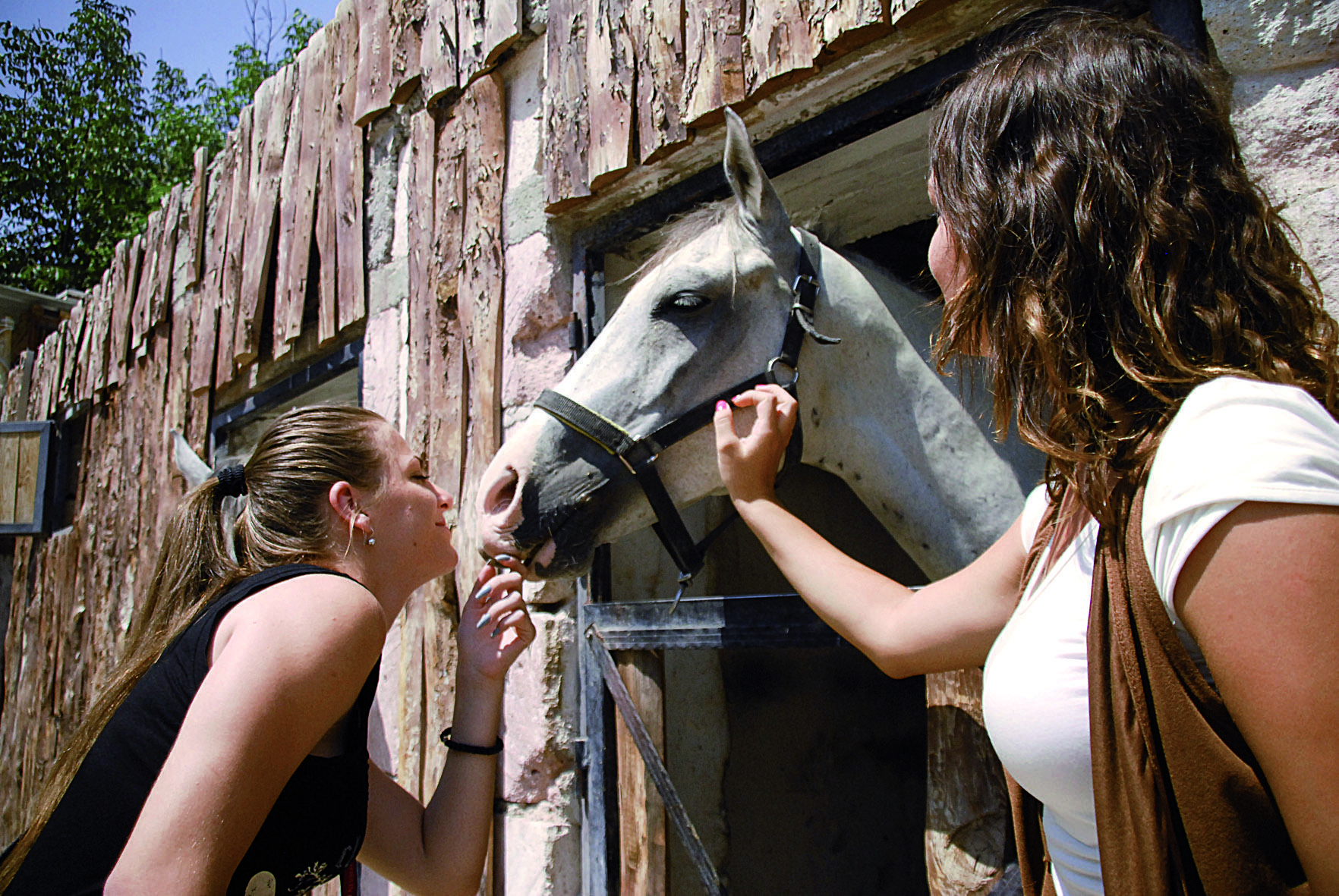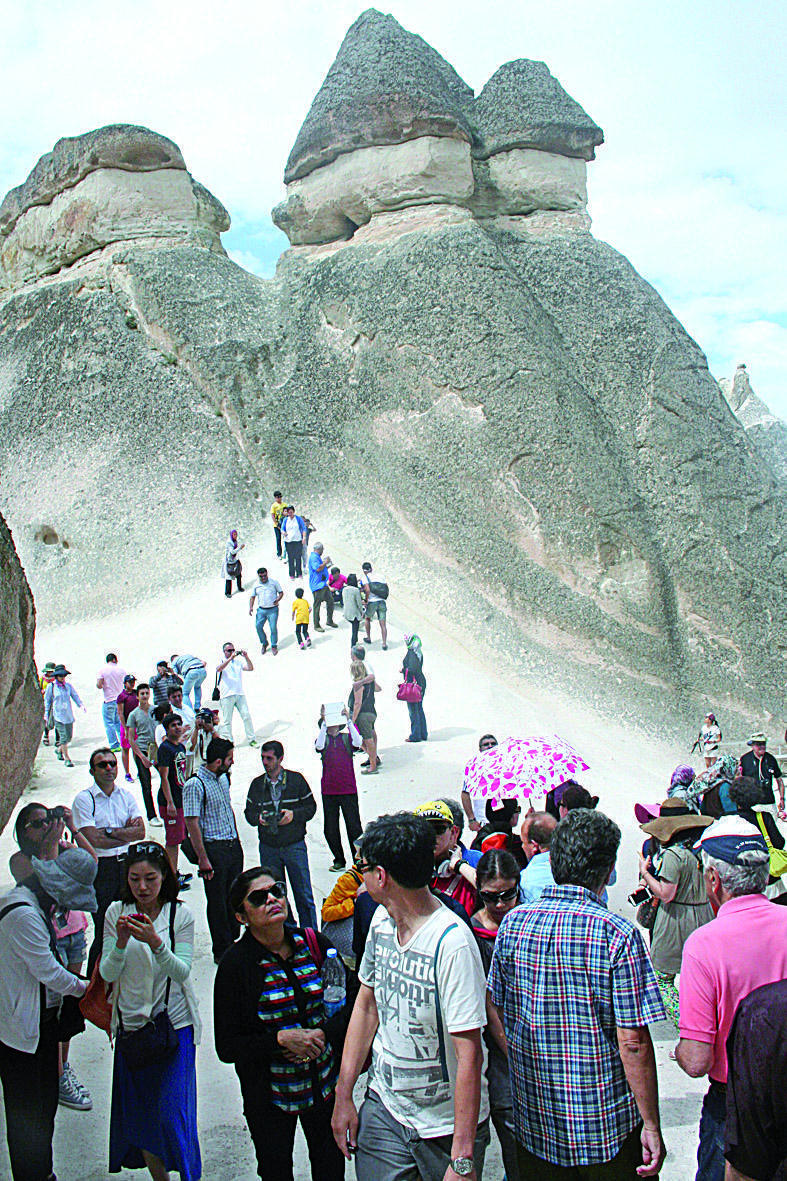Does Cappadocia mean 'the land of beautiful horses'?
ISTANBUL

AA Photo
With its fairy chimneys and hot air balloons, Cappadocia in central Turkey is a world-renowned touristic region, but the meaning of its name is still a matter of debate as seen in the latest claim by a famous Turkish photographer.
Writing for the August 2015 issue of #tarih magazine, photographer and researcher Ozan Sağdıç suggested that Cappadocia does not mean “the land of beautiful horses,” as he had to make up the name to avoid the wrath of the 1980 coup administration in Turkey.
Although “Cappadocia” was first used in an inscription erected in Persia during the rule of Darius the Great (522-486 BC) in Old Persian, Akkadian and Elamite, there has been no scholarly consensus over the meaning of the historical region’s name.
Some had associated the name with the horses that are seen in the ancient inscription alongside the people of Cappadocia who were presenting them as gift or tax to the Persian king.
More widely accepted etymological explanations, however, associate the name with Khepat, the main god of the region. As Turkish researcher Bilge Umar says, the earliest form of Cappadocia could be “Ketpatukh” (the country of the people of Khepat).
Other historic suggestions, such as the one by the Pliny the Elder, associates the name with a local creek named Cappadox, which happens to be the name of a son of the Assyrian King Ninus.
Then how come most Turkish guides in Cappadocia still assuredly tell millions of tourists each year that they are in the land of beautiful horses?
 DHA Photo
DHA Photo“It was a compulsory lie,” wrote Sağdıç, who dedicated a significant part of his life to documenting Cappadocia’s volcanic landscape and long history.
In 1985, the Turkish photographer had presented a visual show about Cappadocia to the UNESCO General Assembly, which then included the region in its World Heritage List. For his efforts to promote Cappadocia, the region’s Ürgüp Municipality awarded Sağdıç and named one of its streets on him.
According to Sağdıç, “the horse myth” dates back to the spring of 1981, months after the 1980 coup in Turkey, when he presented the first staging of his Cappadocia show to the military brass.
Turkey’s Tourism Ministry had decided in that year to open the tourism season with a sumptuous ceremony in Cappadocia in which Gen. Kenan Evren, the leader of the coup, would also be present.
To organize an interesting event, top officials at the Tourism Ministry contacted Sağdıç, who had been leading efforts to publicize Cappadocia, which had been largely ignored by the public until then.
“I had noticed that there was no proper publication in Turkish to promote this interesting landscape. My goal was to prepare an album which could also be used as a travel guide,” Sağdıç wrote.
When he was approached by Tourism Ministry officials, Sağdıç said he offered to stage an audiovisual show called a diaporama during the event for Evren. The ministry approved it and also decided to support Sağdıç’s Cappadocia travel guide project.
 Cihan Photo
Cihan PhotoSağdıç’s joy, however, yielded to concerns, when one of his friends, a manager at the state broadcaster TRT, told him that he was reprimanded by the military administration because a documentary they aired included the word “Cappadocia.”
Sedat Örsel, the TRT manager, told Sağdıç that nationalist military officials banned the word “Cappadocia,” presuming that it was of Greek origin.
“I had never seen in any source that the word was of Greek origin. On the contrary, the presumed Turkish word that military officials wanted to replace Cappadocia with, ‘Göreme,’ was actually of Greek origin, coming from ‘Korama,’” Sağdıç wrote in #tarih magazine.
When Örsel heard Sağdıç’s explanation, he phoned Adm. Işık Biren, who was occupying the office of the parliamentary speaker at the time as part of the junta.
“Cappadocia is not Greek. I have a friend here who knows the issue very well,” Örsel told the admiral, who subsequently asked what language it came from.
With a powerful admiral waiting on the line, Sağdıç said, “It could be Persian.” The information was forwarded by Örsel to the admiral on the phone as “it was Persian.”
“And what does it mean in Persian?” the admiral asked Örsel, according to Sağdıç, who answered that “it could mean the land of beautiful horses,” after quickly thinking of how horses played a key role in the Hittite history of the region.

 AA Photo (L), Cihan Photo (R)
AA Photo (L), Cihan Photo (R)Örsel forwarded Sağdıç’s doubtful answer to the admiral with certainty again, which ultimately saved the photographer’s Cappadocia projects.
“Persians had named it... Katpatukya, which meant in that language the land of the beautiful horses.”
This was the first sentence of the preface written by Sağdıç for the first extensive travel guide in Turkish about the Cappadocia region, whose first copy was presented to the coup leader, Evren.
“My Cappadocia book was based on serious studies and sound data except this compulsory lie,” Sağdıç said, stressing that it also served as a “merciless trap” due to the “widespread culture of plagiarism” which induced the proliferation of “the horse myth.”
“If I visit Cappadocia now and say that I made that meaning up, I’m sure they would tell me that it could not possible as they heard the story from their grandparents,” Sağdıç added.
“Some urgan legends may be rooted in an irrelavent incident or a simple remark. Rumors built up and started to be accepted as fact through generations. This is how a lie that I was forced to make up in haste became something that some consider the universal truth. But doesn’t Cappadocia deserve the description of ‘the land of beautiful horses?’ It surely does. In fact, abandoned horses are running around in the Sultan Reeds area of Cappadocia even today. I think the people of Cappadocia should keep using this handsome adjective, but they shouldn’t involve Persians in it. Or it would be a disgrace,” he said.
 DHA Photo
DHA Photo 




